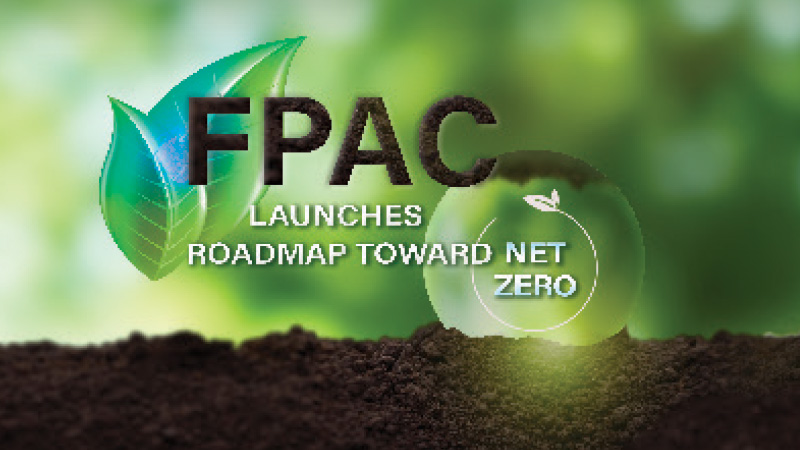The Forest Products Association of Canada (FPAC) recently launched a report to address the future of sustainability in forestry, Climate Change Mitigation in Canada’s Forest Products Sector: Roadmap Toward Net-Zero.
The report was developed in partnership with sustainability experts at Delphi Group, a strategic consulting firm specializing in climate change, sustainability, and ESG. It provides an actionable roadmap to help seize the benefits of decarbonization pathways, the use of carbon-storing wood products, and climate-smart forestry in the face of worsening natural disturbances including drought, pest outbreaks, and wildland fire.
The findings highlight that with the rapid adoption of new technologies, appropriate investments and new policies, Canada’s forest products sector could contribute between 18-46 million tonnes CO2e in emission reductions annually (relative to current emissions) by 2050. Climate-smart forestry practices will also increase the resilience of Canada’s forests and help mitigate the impacts of worsening natural disturbances, including increasingly frequent and devastating wildfires.
First popularized in Europe, climate-smart forestry is “a targeted approach or strategy to increase the climate benefits from forests and the forest sector, in a way that creates synergies with other needs related to forests.” It consists of three components:
1. Increasing carbon storage in forests and forest products, in conjunction with other ecosystem services, such as protecting biodiversity and water quality. Central to this practice is promoting global afforestation efforts and preventing deforestation, like the Government of Canada’s Two Billion Trees commitment.
2. Using wood resources as a sustainable substitute for
non- renewable, carbon-intensive materials. Forest products store carbon while in long-term use and, in some cases, following disposal. They can also replace more emissions-intensive materials, like steel and concrete.
3. Enhancing forest health and resilience through climate change adaptive forest management, i.e., reducing susceptibility to natural disturbances like invasive species and wildfire.
According to the Roadmap Toward Net-Zero, examining innovative forest practices with a view to identifying and customizing climate-smart principles would enable the sector to increase the resilience and mitigation potential of Canada’s forests.
“For decades, Canada’s forest sector and its workers have committed to sustainable forest management practices and a focus on environmental stewardship – playing a proactive role in global dialogue and adhering to national and international emissions reporting standards that quantify forestry-related climate and carbon impacts,” said Derek Nighbor, FPAC President and CEO, in a December news release. “Our collective experience underscores the urgency of proactive measures to mitigate wildfire risks and protect our people, communities, and critical infrastructure. As we come off the worst fire season in our country’s history, the need for forestry solutions including the more active management of Canada’s forests has never been more important.”
Other key components of the Roadmap Toward Net-Zero include:
• Reducing direct carbon emissions in forest products sector operation by using new strategies and technology, including bioenergy and the potential for Bioenergy with Carbon Capture and Storage (BECCS) technology.
• Reducing emissions in other sectors and the built environment by using forest products (e.g. wood and bioenergy). This would mean substituting carbon-storing wood products in place of higher carbon-emitting materials, therefore improving the downstream carbon impacts of projects.
· Increasing the resilience and carbon sequestration capacity of Canada’s managed forests by working with the federal, provincial, and territorial governments, NGOs, Indigenous Peoples, industry groups, labour partners, and academic institutions.
Canada is home to 9% of the world’s forests and has maintained over 90% of its original forest cover. The Roadmap Toward Net-Zero report states that the forest products sector plays an important role in the Canadian economy, with revenues of more than $73 billion annually. The forest sector supports more than 300 forest-reliant communities (with 70% of Indigenous communities in Canada sitting within forested areas), and directly employs more than 184,000 Canadians.
The report found that when examining the forest products sector’s direct carbon emissions relative to the indirect emissions from the forest product value chain, less than 10% of total value chain emissions are within the industry’s direct control. Most of the emissions come from forest disturbances such as wildfires or from end-of-life disposal of forest products. The Roadmap Toward Net Zero says that while the forest products sector will focus on addressing emissions and carbon removals within its direct control, significant emissions reductions can occur in the value chain through collaboration and partnership. While the sector is well-positioned to take the lead on many fronts, collaboration across the entire value chain, from the forest to product disposal, and across many other sectors will be required to ensure success.
“Canada’s forest products sector continues to evolve and is in a unique position to both reduce GHG emissions, but also support a transition to a lower carbon, and more circular economy,” said Kate Lindsay, FPAC’s Senior Vice President and Chief Sustainability Officer. “The forest sector recognizes the importance of global pledges to advance climate action, halt and reverse deforestation and land degradation, and promote sustainable sourcing. These efforts are part of a bigger international dialogue, and Canada must do this work in step with our domestic and international partners.”
Visit www.fpac.ca/reports/climate-change-mitigation-in-canadas-forest-products-sector-roadmap-toward-net-zero for more information and to access the full report.
FPAC provides a voice for Canada’s wood, pulp, paper, and wood-based bioproducts producers nationally and internationally in government, trade, and environmental affairs. FPAC and its members are committed to collaborating with Indigenous leaders, federal and provincial governments, labour partners, community groups, and other rightsholders and stakeholders to secure and advance the sector’s environmental, social, and economic potential for the long-term.
References
Forest Products Association of Canada. (n.d.). Executive Summary: Climate change mitigation in Canada’s Forest Products Sector: Roadmap Toward Net-Zero. FPAC.CA. www.fpac.ca/reports/climate-change-mitigation-in-canadas-forest-products-sector-roadmap-toward-net-zero
Forest Products Association of Canada. (2023). Climate Change Mitigation in Canada’s Forest Products Sector: Roadmap Toward Net-Zero. https://assets-global.website-files.com/60ccb5b3bd077c10c67edcec/6573921d696f69ce4173bd88_FPAC%20Report%20231108_EN_FINAL_DIGITAL_pages.pdf
Forest Products Association of Canada. (2023, December 11). COP 28: Canada’s Forest Sector Unveils Roadmap to Support Climate Resilience and Emissions Reduction Targets [Press release]. www.fpac.ca/posts/cop-28-canadas-forest-sector-unveils-roadmap-to-support-climate-resilience-and-emissions-reduction-targets.
Forest Products Association of Canada. (2024, February 13). Canada’s Forest Sector Unveils Roadmap Toward Net-Zero at Globe Forum 2024 [Press release]. www.fpac.ca/posts/canadas-forest-sector-unveils-roadmap-toward-net-zero-at-globe-forum-2024.


 1-866-985-9780
1-866-985-9780